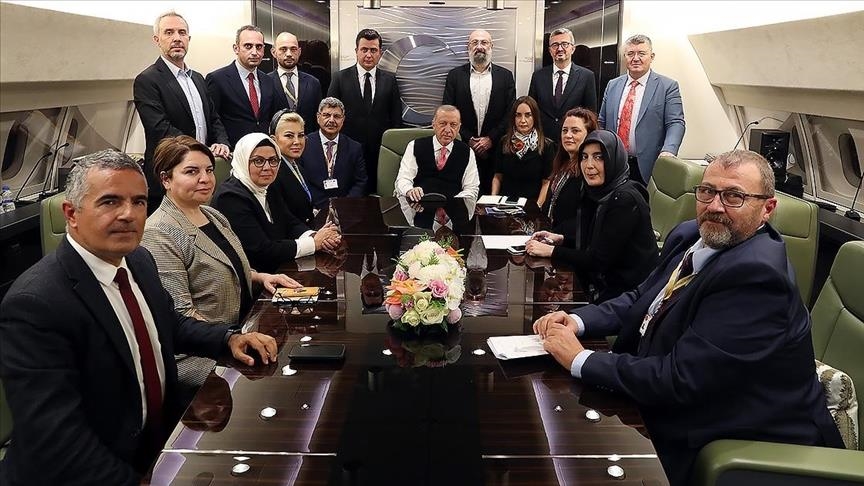Turkey will conduct anti-terror cross-border operations 'whenever necessary': President
'There is no stepping back' from operations to protect Turkey from terrorists, says Recep Tayyip Erdogan

ANKARA
Turkey will conduct cross-border operations to fight terrorism – such as its operations in northern Syria or northern Iraq – “whenever necessary," said President Recep Tayyip Erdogan in remarks released Monday.
"There is no stepping back from it," he told reporters on his Sunday return flight from the G20 Leaders' Summit held in Rome.
He again called on Turkey’s NATO ally US to “not support terrorist groups," in a clear reference to the YPG/PKK, an offshoot of the terrorist PKK based in Syria whose longstanding US support Turkey has long cried foul about.
Since 2016, Turkey has launched several cross-border operations into northern Syria to block the formation of a terror corridor there and protect locals, in addition to its occasional strikes at PKK bases in northern Iraq, where the terrorist group plans attacks.
"We can spare no effort in our fight against terrorist groups," said Erdogan.
On his weekend meeting with US President Joe Biden on the summit sidelines, Erdogan said they discussed Turkey’s procurement of F-16 fighter jets from the US.
"I didn't see any negative approach," he said of their meeting, adding that he hopes to conclude the "sensitive issue" concerning relations between the two countries.
Erdogan said both countries’ foreign and defense ministers would also discuss the issue with each other.
"We had a frank and constructive meeting with Biden," Erdogan said, adding that Biden said he will do his best to resolve the issue.
Erdogan said Turkey and the US also agreed to focus "more intensely" on economic ties, and discussed cooperation in Afghanistan, Syria, Libya, and the Eastern Mediterranean.
He added that he told the US and French presidents how establishing a base in Alexandropolis, Greece near the Turkish border "seriously disturbs" Turkey.
Erdogan said Libya, Afghanistan, and the South Caucasus were among the main topics of his 50-minute, closed-door discussion in Rome with French President Emmanuel Macron.
F-16 fighter jets as compensation for owed F-35s
Earlier, Erdogan said the US proposed the sale of F-16 fighter jets as compensation for Turkey's payment for F-35s that the US never delivered.
In 2019, Washington announced that it was taking Turkey out of the F-35 stealth fighter jet program over Ankara's purchase of the S-400, a Russian defense system it bought after its efforts to buy US Patriot missiles were rebuffed.
The US claimed the Russian system posed a safety risk. Turkey, however, stressed the S-400s would not be integrated into NATO systems, and thus pose no threat to the alliance or its armaments.
Ankara also repeatedly proposed setting up a commission to clarify the issue.
Turkish vaccine to be made available to all
Erdogan said his country will share the locally developed COVID-19 vaccine candidate Turkovac with the entire world "without any jealousy" once production starts by year's end, calling this an unprecedented step.
He stressed that once Turkovac enters mass production, Turkey "will hopefully change the world balances a bit."
The vaccine, co-developed by the Turkish Health Ministry, Health Institutes of Turkey, and Erciyes University, has successfully completed Phase 1 and 2 trials in Turkey.
Health Minister Fahrettin Koca recently said the vaccine is close to an application for emergency use approval.
UN climate conference in Glasgow
Asked about the current UN climate conference in Glasgow (COP26), Erdogan said he decided not to go as Turkey's "demands were not met," adding that this was not only about security, but also about "the country’s reputation."
Telling how there are security protocol standards applied to all leaders in international visits, Erdogan said: "However, we were told that these could not be met at the last moment."
"Later, we learned that the standards in our rejected request were provided exceptionally for another country. This also did not conform to diplomatic practices. We couldn't accept this," he added.
"We are responsible for protecting the reputation of our nation. We will not allow the dignity and honor of our country to be damaged anywhere. Thus, we have shown once again that we can build a fairer world only with an egalitarian approach."
The COP26 UN Climate Change Summit kicked off in earnest in Glasgow Sunday with the attendance of nearly 25,000 delegates from 200 countries to lay out concrete steps to cut greenhouse gas emissions across the planet.
The summit is seen as critical for countries to submit updated and more ambitious climate action plans, with broader steps expected from nations contributing the most emissions, including the US, China, India, and Russia.
Yet, the presidents of Russia and China – two of the world's top five emitters – have confirmed that they are not attending the event.
Hosting the summit, UK Prime Minister Boris Johnson said on Sunday that "if Glasgow fails, the whole thing fails."
He said agreements at the summit on coal, moving to electric vehicles, support for developing nations, and reforestation would be crucial.
* Writing by Beyza Binnur Donmez and Jeyhun Aliyev









